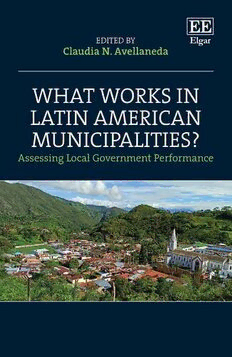
What Works in Latin American Municipalities?: Assessing Local Government Performance PDF
237 Pages·3.472 MB·English
Most books are stored in the elastic cloud where traffic is expensive. For this reason, we have a limit on daily download.
Preview What Works in Latin American Municipalities?: Assessing Local Government Performance
Description:
This incisive book presents a critical compilation of empirical studies assessing local government performance in Latin America. Analysing original administrative data from municipalities in the understudied countries of Brazil, Chile, Colombia, Ecuador, and Mexico, Claudia N. Avellaneda and contributors pose the titular question: what works in Latin American municipalities? Chapters operationalize municipal performance across six different dimensions and policy areas, including: fiscal inputs, effectiveness in grant acquisitions, education outcome quality, financial efficiency, participatory decision-making, and responsiveness to urban changes. The six studies test different theoretical frameworks derived from political science, public policy, and public administration literature, focusing on the variety of individual, organizational, and contextual factors affecting municipal performance across the region. Examining a diverse range of factors, from mayoral characteristics and bureaucratic expertise to guerrilla presence and intergovernmental cooperation, the book highlights the complexity of identifying what works in Latin American municipalities and ultimately makes the case for how future research should be undertaken. Timely and original, the book will be an essential read for public administration, public management, and local government practitioners. Its original empirical research will also prove beneficial to students and scholars of government, public policy, political science, and public administration across Latin America and the rest of the world.
See more
The list of books you might like
Most books are stored in the elastic cloud where traffic is expensive. For this reason, we have a limit on daily download.
